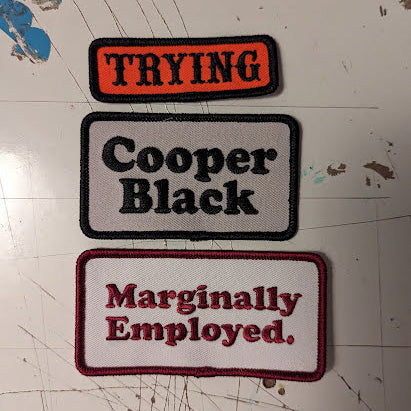
A Patch Three Pack
$20
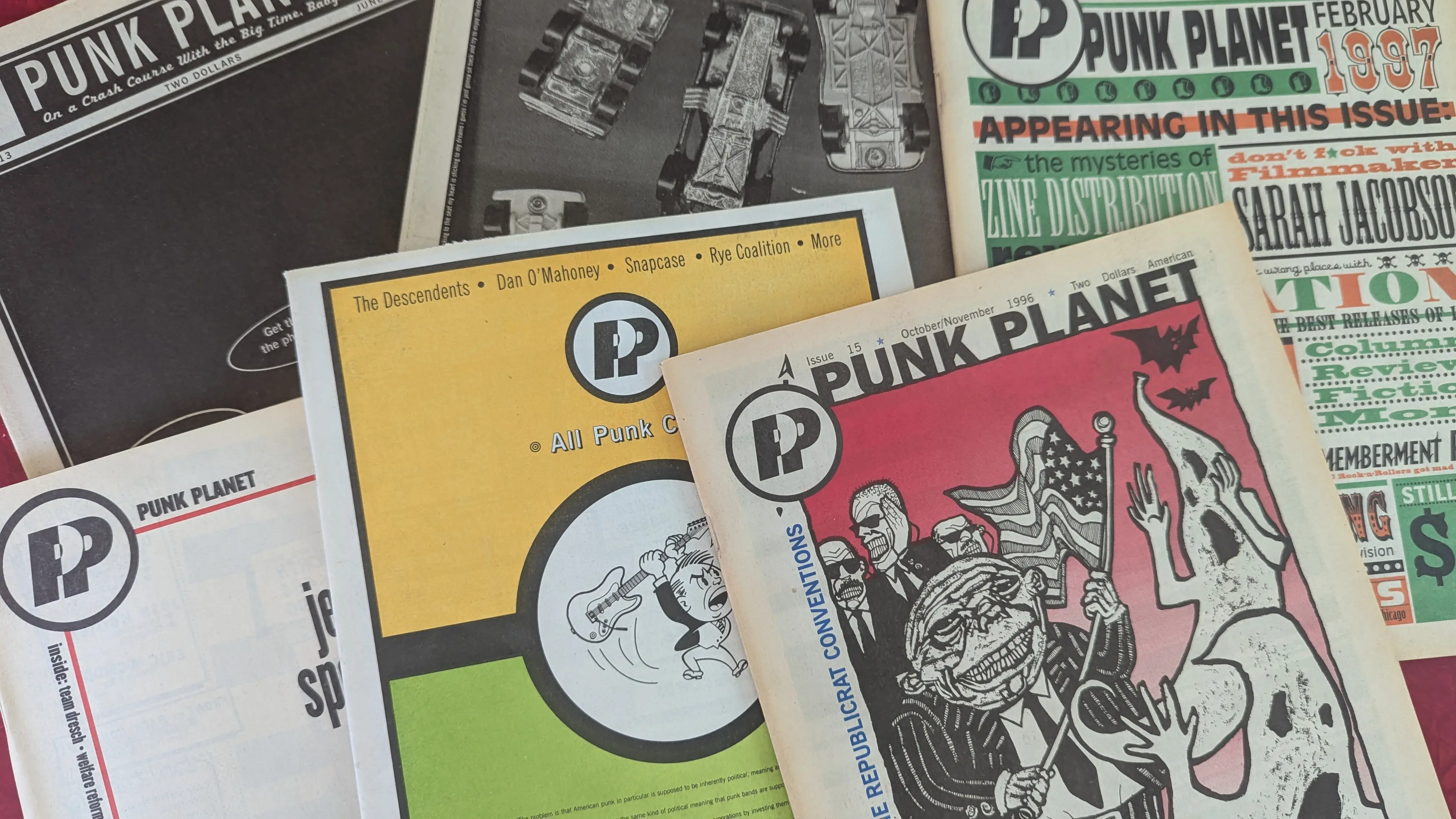
Punk Planet issues 13-18.
2024 marked 30 years since the start of Punk Planet, the magazine I ran for 13 years. To commemorate that milestone, I wrote 13 posts over 13 months, each one about a single year of the magazine. A year of learning, a year of trying, a year of making something impossible possible.
Read: Year One | Year Two | Year Three | Year Four | Year Five | Year Six | Year Seven | Year Eight | Year Nine | Year Ten | Year Eleven | Year Twelve | Year Thirteen
Punk Planet Year Three is one of my favorite years of the magazine (though, admittedly, I'll probably write that a lot in the coming months). This was the year that the very public learning process of the first two really started to produce results. The design of the magazine, which I wrote about at length in my Year Two reflection, had really solidified at this point and, with the look of PP much more solid, I found time to finally focus on the actual editorial side of the magazine.
Editorially, Punk Planet Years One and Two was a crapshoot. By and large we were running material that was coming in from anyone that sent things in (on 3 1/2" floppy disk). We had regular columnists, sure, and there were repeat contributors for interviews and things, but mostly we ran what came in, as long as it met a pretty low bar. That changed dramatically in Year Three, when we ran the first cover story I solicited from writers in issue 15.
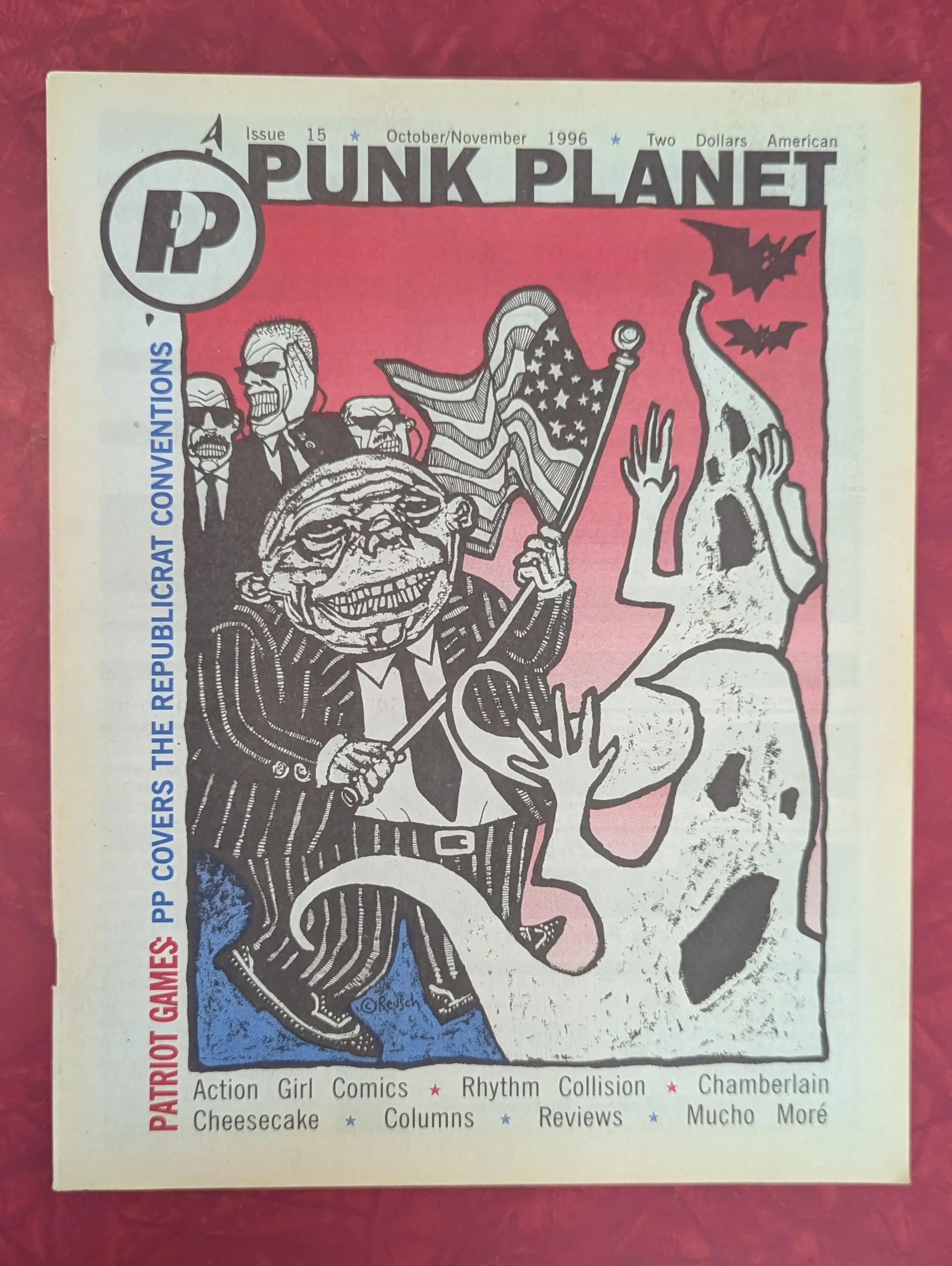
PP15, featuring an incredible illustration by Mark Reusch.
It was 1996, Bill Clinton was up for reelection, Republican Bob Dole was running against him. As young punks, the height of Clintonian politics felt deeply alienating, and while Punk Planet had never shied away from being political (just a couple issues before we ran an article called "Fuck the Vote" written by an author named Atom, who I met when he was a roadie for the band Avail and who would later become award-winning journalist AC Thompson), we were still very much a music magazine at that point. But the Democratic National Convention was in Chicago that year (as it is again this year) and I thought there was an opportunity to do something different.
What if, I remember thinking, we sent someone to write about the DNC in Chicago and the RNC in San Diego, to give a sneering "pox on both houses" take on the state of US politics in the mid-90s. Chicago was easy. It was local and my friend, the writer and artist Paul Chan (who has gone on to win a MacArthur Genius Grant) was game to write an atmospheric, pessimistic take on the festivities (and managed to get a press pass into the hall itself). But the RNC was a bigger problem. San Diego was far away, we had zero dollars to travel, and I didn't know any writers that were local. But new PP contributor Joel Schalit, who would become a contributing editor the magazine in a few issues, knew someone, Aaron Shuman, and he was game to go.
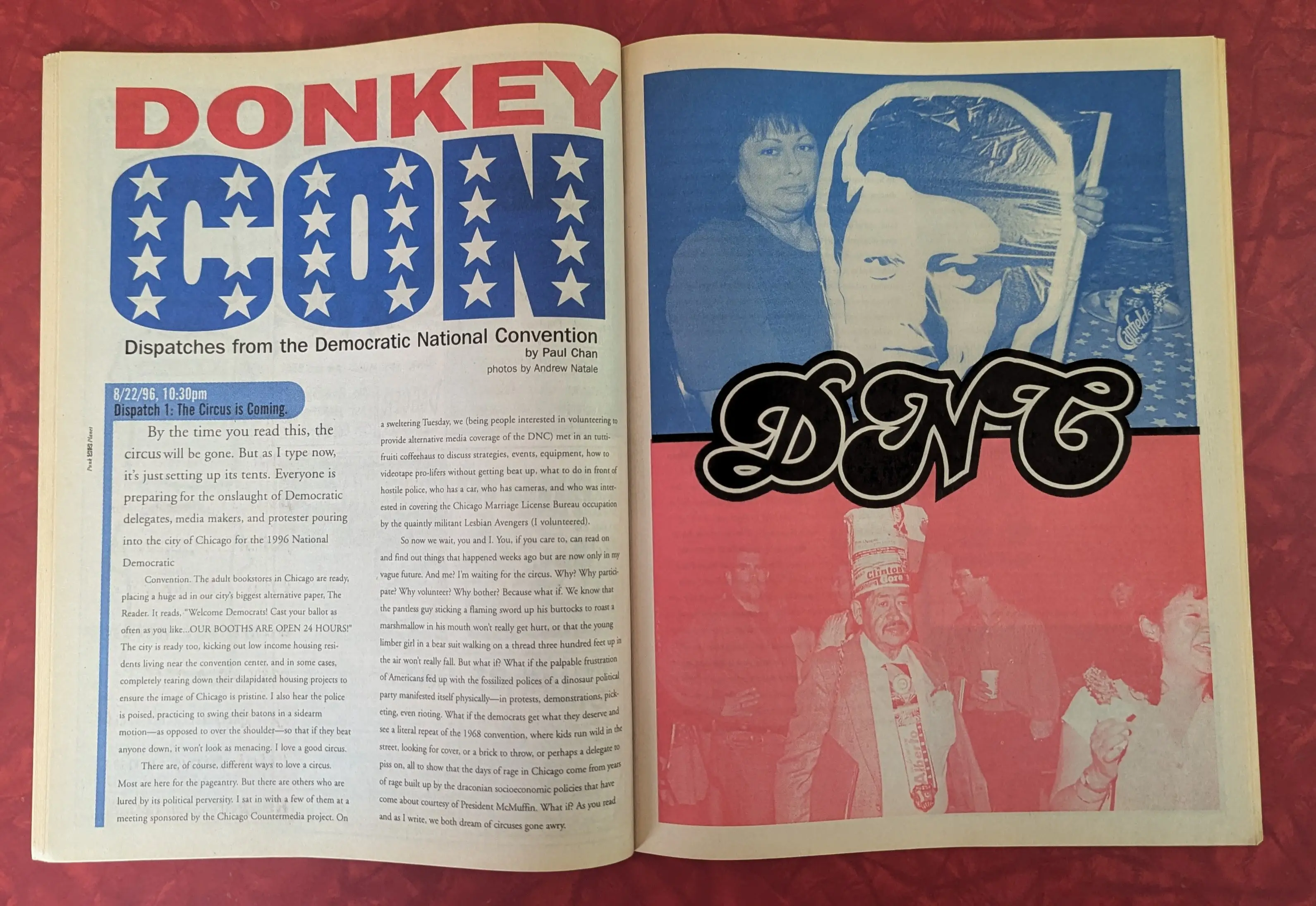
The opening spread for our DNC package
The two articles that ran in a special section in Punk Planet 15, "Donkey Con: Dispatches from the Democratic National Convention," and "No Place in the Sun: All alone at the Republican National Convention," are big and ambitious and angry and funny and very much capture where I think many of us were at that moment in time.
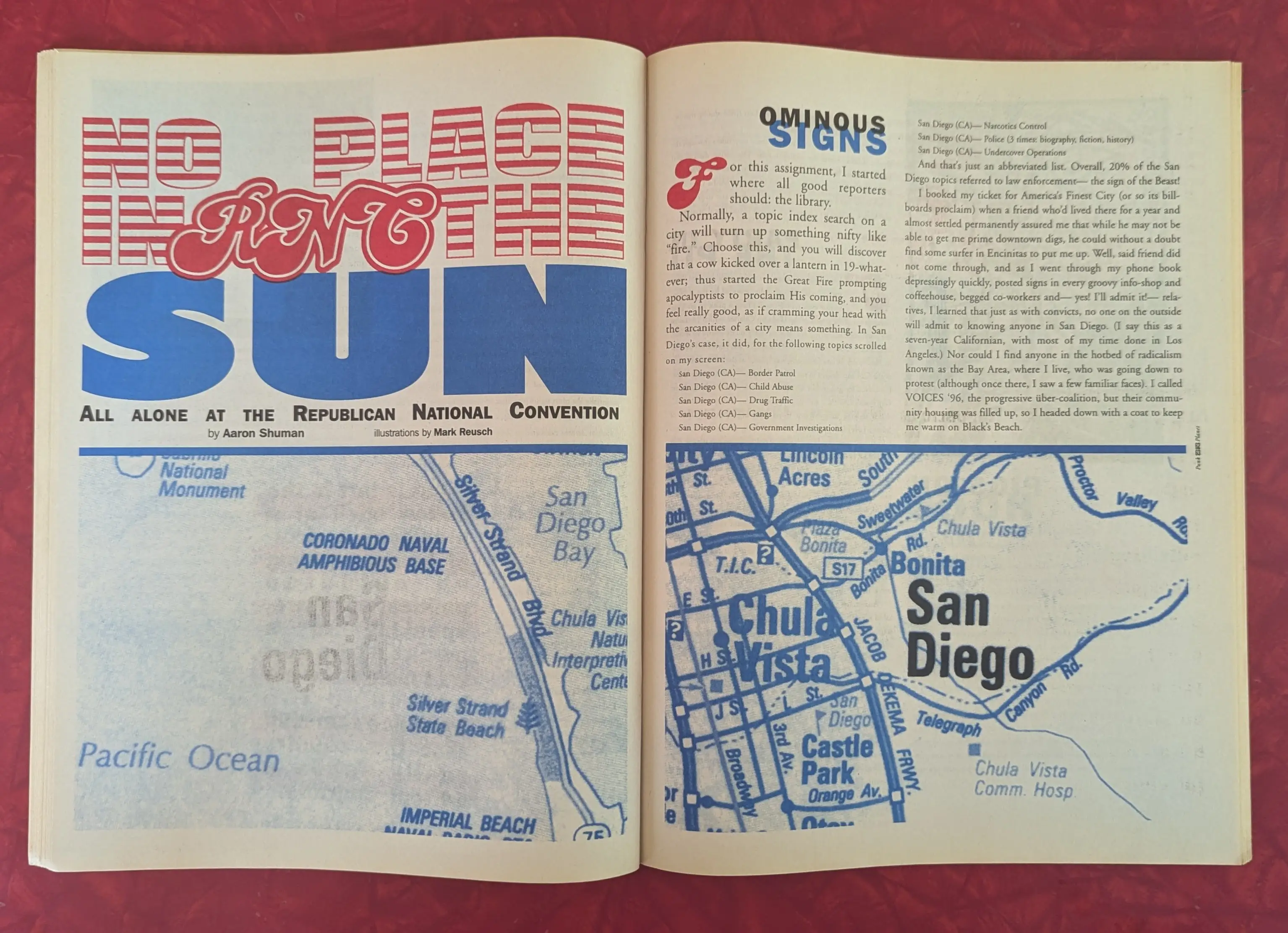
The opening spread for our RNC package
In reflecting on the first Democratic National Convention held in Chicago since the infamous one in 1968, Paul Chan wrote "The state of young people in America is in many ways bleaker than in 1968. America has, since the '80s, more children in poverty than any other industrialized country in the world. We also have the highest infant mortality rate. It gets worse when you grow up, because there has been a steady decline in federal funds for public schools, a slashing of federal and state college education through subsidized loans and school grants. And with our economy shifting principally from manufacturing to service, most young Americans are stuck with low wage, low benefit jobs without any prospects of vertical socio-economic movement. All the ingredients for a social rupture in the form of protests, demonstrations, and activism are there. But the masses aren't massing, which in itself is another sign of the bleakness most young people feel about things changing."
Paul could, of course, be writing about today.
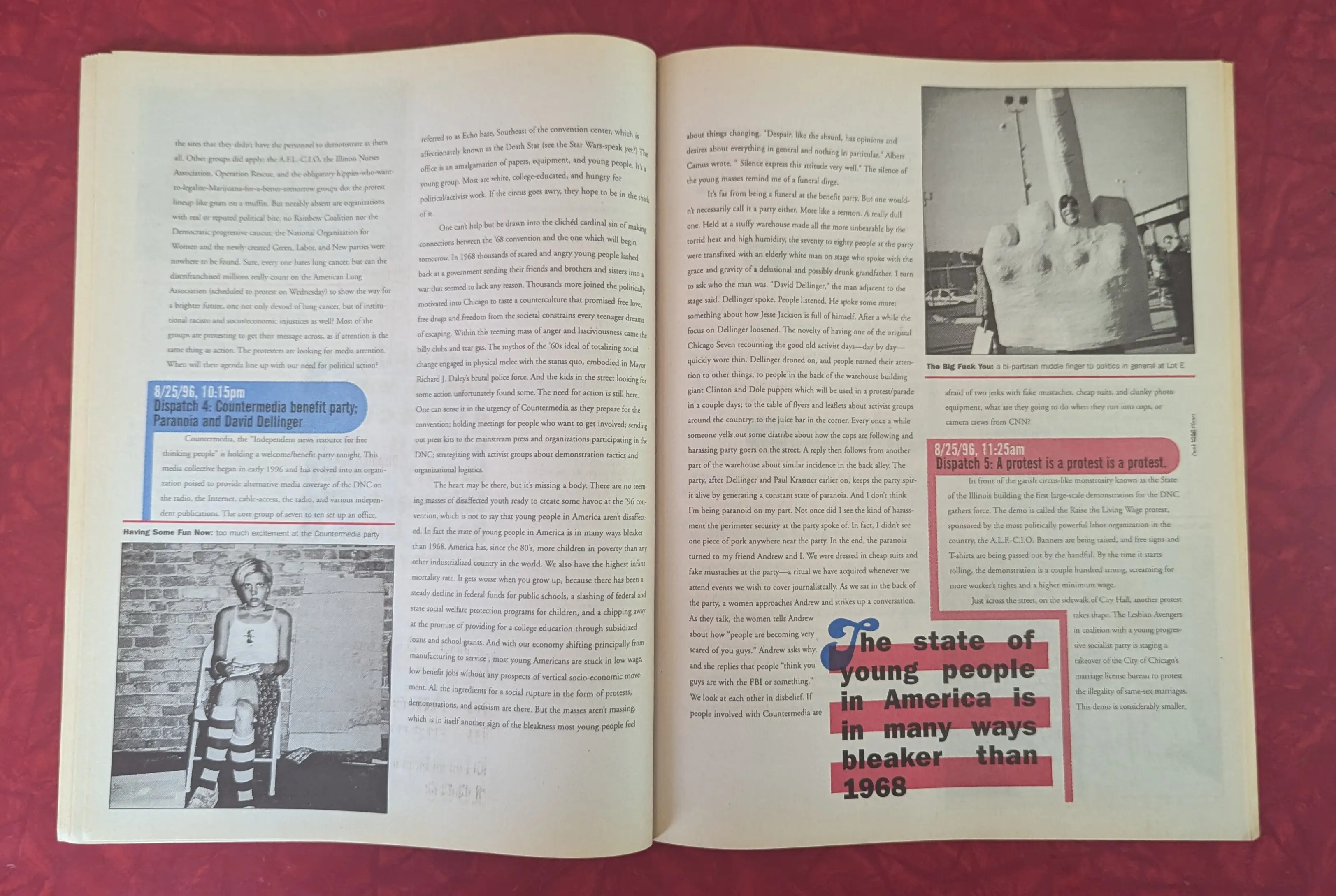
One of the interior spreads for the DNC piece, the only time color appeared inside the magazine.
It's not lost on me that this Year Three essay happens to fall directly in the middle of summer 2024, right between the Republican and Democratic National Conventions, 28 years later. It's another moment where there is sharp critique of both parties, especially among youth and the genocide in Gaza, but due to the upheaval of the presidential race in the last two weeks it feels like there's a lot more unpredictability floating around right now than there was in '96 (or maybe I'm just older and want to see hope more than we did in the '90s).
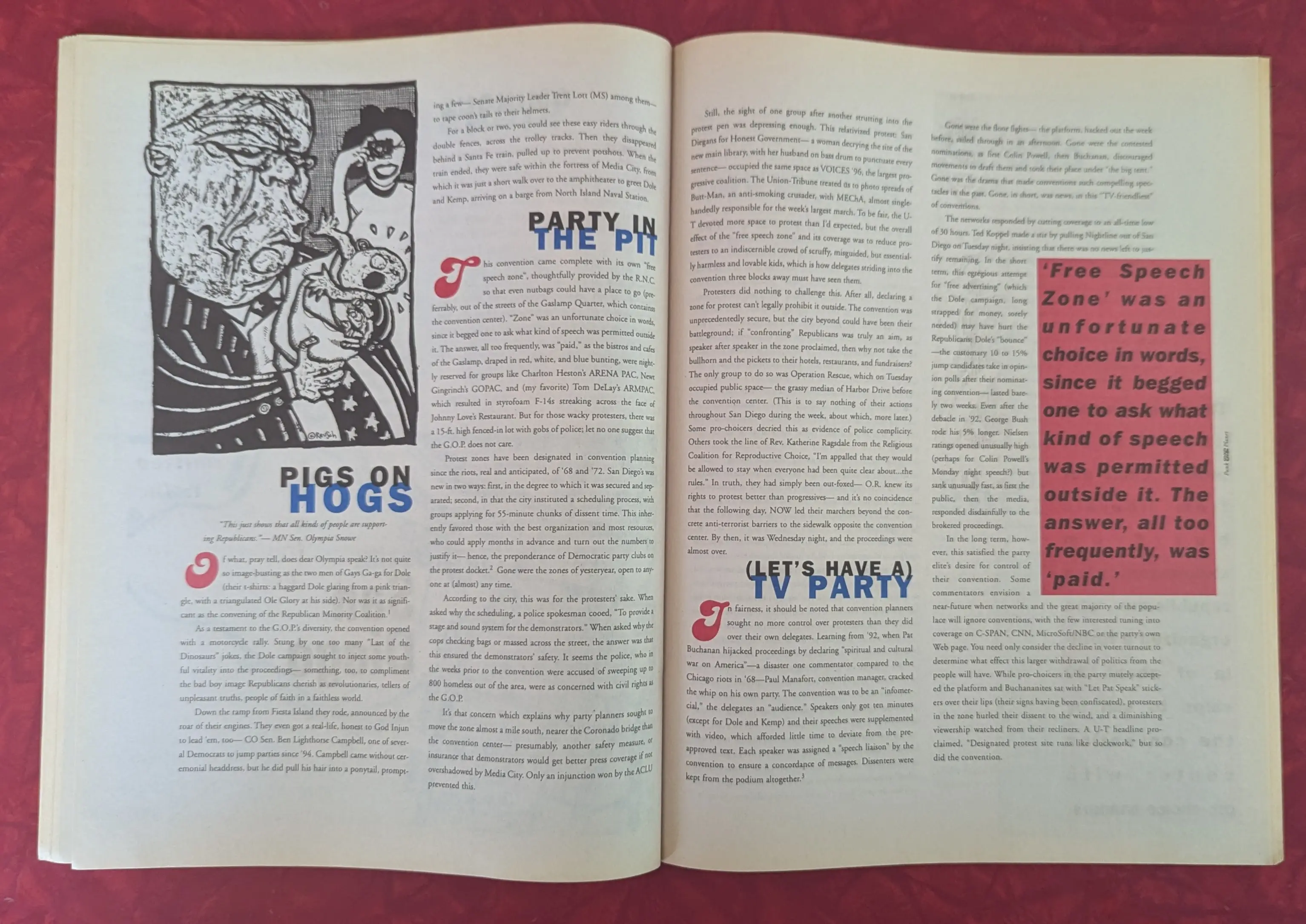
One of the interior spreads for the RNC piece, featuring Mark Reusch's illustration.
The package that we put together, which featured photographs from the DNC by Andrew Natale (RIP) and illustrations for the RNC piece by stellar illustrator Mark Reusch, was the only time in the 80 issues of Punk Planet that we ran color inside the magazine, adding spot color red and blue to the 20 page section, as well as to the cover. While we'd never do color inside again, there was never a black-and-white cover on the magazine after we did this one in color.
Looking back 28 years later, eschewing expectations by running a wholly political package as our first cover story feels very Punk Planet: as the years went on we'd constantly defy easy definition, almost reflexively. But it also feels very Punk Planet because those 20 pages are strong, even reading them today. For something we didn't know how to do, we pulled off something remarkable.
I guess that could apply to every issue of the magazine: We never knew what we were doing, and we pulled off something remarkable every time.
There's a lot more that's great about Year Three of Punk Planet. The playfulness in design, the growing editorial ambition (there are a lot of bangers in Year Three), but one of the most impactful changes happened not in the pages of the magazine, but in how those pages reached people. Part way through Year Three, Punk Planet was picked up for distribution by Mordam Records, the preeminent punk record distributor based in San Francisco. It changed everything for us, adding an air of real legitimacy to the magazine, and meant that we would be paid in a predictable manner which, in turn, meant we could pay contributors for the first time (not a lot, but something). Everything that came after this year is thanks in part to Ruth and the entire crew at Mordam taking a chance on us.
What Mordam's trust in Punk Planet enabled, coupled with the editorial breakthroughs in Year Three, was some of the best years of the magazine's run, starting with Year Four. Up next month. See you then.
Published July 31, 2024. |
Have new posts sent directly to your email by subscribing to the newsletter version of this blog. No charge, no spam, just good times.
Or you can always subscribe via RSS or follow me on Mastodon or Bluesky where new posts are automatically posted.
Whistle Up 2: Rise of the Whistle Goblins
Today the crew of weirdo printers that I call the whistle goblins passed a half-million whistles printed and shipped. I wrote about how we got there and how you can start printing whistles yourself.
Posted on Feb 8, 2026
Foundational Texts: Jenny Holzer's Truisms
The first installment in the monthly Foundational Texts series looks at artist Jenny Holzer's Truisms, what they meant to a 14-year-old me and how they still resonate today.
Posted on Jan 31, 2026
From Chicago to Minneapolis to wherever is next, more and more it's very clear that we are all we have. And maybe that's enough.
Posted on Jan 21, 2026